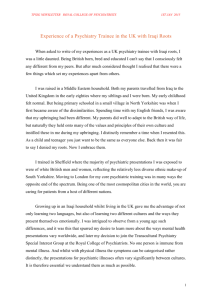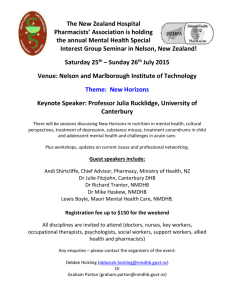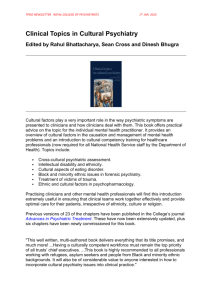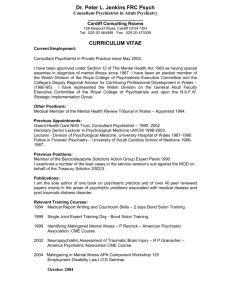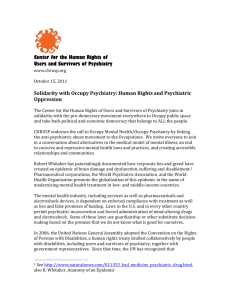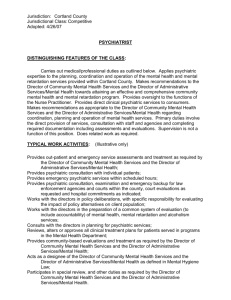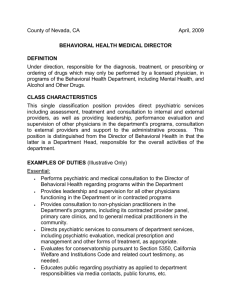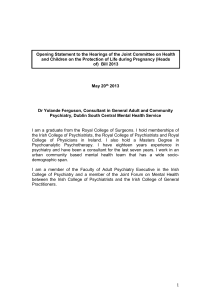Quarterly Newsletter - March 2010
advertisement
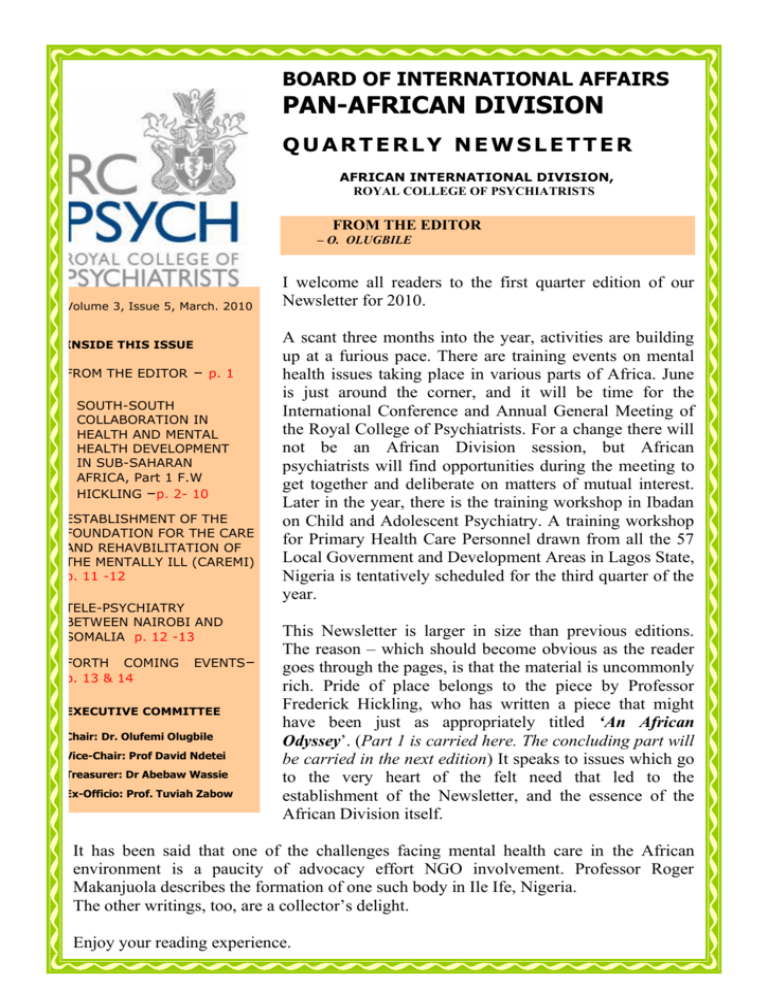
BOARD OF INTERNATIONAL AFFAIRS PAN-AFRICAN DIVISION QUARTERLY NEWSLETTER AFRICAN INTERNATIONAL DIVISION, ROYAL COLLEGE OF PSYCHIATRISTS FROM THE EDITOR – O. OLUGBILE Volume 3, Issue 5, March. 2010 INSIDE THIS ISSUE FROM THE EDITOR – p. 1 SOUTH-SOUTH COLLABORATION IN HEALTH AND MENTAL HEALTH DEVELOPMENT IN SUB-SAHARAN AFRICA, Part 1 F.W HICKLING –p. 2- 10 ESTABLISHMENT OF THE FOUNDATION FOR THE CARE AND REHAVBILITATION OF THE MENTALLY ILL (CAREMI) p. 11 -12 TELE-PSYCHIATRY BETWEEN NAIROBI AND SOMALIA p. 12 -13 FORTH COMING p. 13 & 14 EVENTS– EXECUTIVE COMMITTEE Chair: Dr. Olufemi Olugbile Vice-Chair: Prof David Ndetei Treasurer: Dr Abebaw Wassie Ex-Officio: Prof. Tuviah Zabow I welcome all readers to the first quarter edition of our Newsletter for 2010. A scant three months into the year, activities are building up at a furious pace. There are training events on mental health issues taking place in various parts of Africa. June is just around the corner, and it will be time for the International Conference and Annual General Meeting of the Royal College of Psychiatrists. For a change there will not be an African Division session, but African psychiatrists will find opportunities during the meeting to get together and deliberate on matters of mutual interest. Later in the year, there is the training workshop in Ibadan on Child and Adolescent Psychiatry. A training workshop for Primary Health Care Personnel drawn from all the 57 Local Government and Development Areas in Lagos State, Nigeria is tentatively scheduled for the third quarter of the year. This Newsletter is larger in size than previous editions. The reason – which should become obvious as the reader goes through the pages, is that the material is uncommonly rich. Pride of place belongs to the piece by Professor Frederick Hickling, who has written a piece that might have been just as appropriately titled ‘An African Odyssey’. (Part 1 is carried here. The concluding part will be carried in the next edition) It speaks to issues which go to the very heart of the felt need that led to the establishment of the Newsletter, and the essence of the African Division itself. It has been said that one of the challenges facing mental health care in the African environment is a paucity of advocacy effort NGO involvement. Professor Roger Makanjuola describes the formation of one such body in Ile Ife, Nigeria. The other writings, too, are a collector’s delight. Enjoy your reading experience. QUARTERLY NEWSLETTER - SOUTH-SOUTH COLLABORATION IN HEALTH AND MENTAL HEALTH DEVELOPMENT IN SUB-SAHARAN AFRICA, (1) - F.W HICKLING INTRODUCTION The University of the West Indies (UWI) continues to forge South/South collaborations with Sub-Saharan Africa in the development of health and mental health. Since 2003 the UWI has been training medical undergraduates from Botswana in the Jamaica and Trinidad campuses. The UWI recently sent their special envoy Professor of Psychiatry Frederick W. Hickling to establish links for postgraduate medical training collaboration with Botswana, and to collaborate with the development of community mental health with Sub-Saharan Africa. The visit to Sub-Saharan Africa was catalyzed by the World Psychiatric Association/ Africa Association of Psychiatrists and Allied Professionals Conference held in Abuja, Nigeria October 22-24, 2009. Representing the University of the West Indies Professor Hickling reported on the significant advances in community mental health in Jamaica by his presentation “CARIMENSA: A primary prevention institution of the 21st century” (1). The Caribbean Institute of Mental Health and Substance Abuse (CARIMENSA) is a novel creation of the UWI that has fused psychological and psychotherapy processes with the Creative Arts Therapies in what has been called Cultural Therapies, designed for psychological risk reduction and primary prevention. This presentation triggered an important dialogue between psychiatric colleagues in -2- QUARTERLY NEWSLETTER Sub-Saharan Africa, the African Diaspora, and the World Psychiatric Association based on the transforming deinstitutionalization and community mental health experience of the island of Jamaica (2) of the past forty years. Critical African participants in this dialogue were colleagues from Nigeria, South Africa, Kenya, Ghana and Ethiopia. Colleagues from the World Psychiatric Association, the American Psychiatric Association and the Royal College of Psychiatrists, also participated in these discussions. METHOD In a visit to Botswana February 8-17, South Africa February 17-20, Nigeria February 21-28, and Kenya February 28 –March 2, Professor Hickling met with health officials and administrators, and key psychiatric professionals in those countries. In all countries visited Professor Hickling presented a one-and-a-half hour lecture on “Community Psychiatry - Practice in a Developing Country”, to an audience of psychiatrists, psychiatric residents, medical students and mental health professionals. The role of 'South /South" collaboration with Africa was the central focus of the presentation, especially by sharing the evidence-based data of deinstitutionalization and integration of mental health in primary care that has been achieved with limited RESULTS i Visit to Botswana Since 2009, The University of the West Indies has been producing medical graduates for the Government of Botswana. Already 14 graduates have been produced from the -3- QUARTERLY NEWSLETTER Jamaican campus of the UWI at Mona. This has exposed a pressing need for the provision of postgraduate training facilities for these graduates in all branches of medicine. The primary purpose of the visit to Botswana was to establish postgraduate medical training collaboration with that country. Discussions were held with the representatives from the Botswana Ministry of Health, and from the University of Botswana to pursue this objective, with positive outcomes being pursued. It was not possible to visit the psychiatric services in Botswana during this time but it was ascertained that The Government of Botswana had just completed the building of the new Rana Mental Hospital in Lobatse which had replaced the old mental hospital in that city. Discussions with psychiatrist Dr. Paul Sidani in Francis Town indicated that the community mental health service in Botswana was still in its infancy. Professor Hickling gave a lecture to the 35 medical students at the new Lecture Theater building of the University of Botswana on “Practicising Community Mental Health in a developing Country”. The interest in psychiatry displayed by these medical students in the early stages of their training was surprising and refreshing. ii Visit to South Africa Professors Charles Cambridge, Professor of Management at the University of California and Professor Hickling gave a lecture to 100 Nurse Managers of the management team of the Department of Health of Gauteng Province Johannesburg on the ‘Psychology of Change’, during which Professor Hickling introduced the concept -4- QUARTERLY NEWSLETTER and process of Cultural Therapy, and the existence of the Masters in Cultural Therapy at the UWI Mona. The response and discussions indicated that the nursing practitioners of that Province were eager to embrace mental health primary care and cultural therapy as primary prevention and risk reduction. Professor Hickling visited the Department of Psychiatry at the University of Limpopo with Professor Solomon Rataemane, and visited the secondary care Psychiatric Unit at the Teaching Hospital of the University of Limpopo (Medunsa Campus), and presented the lecture on community psychiatry in Jamaica to psychiatrists, residents and other mental health colleagues including Professor Gboyega Ogunbanjo, Head of the Department of Family Medicine and Primary Health Care. The discussion that followed indicated the very important opportunity for the collaboration in the development of community mental health and Cultural Therapy with South Africa. iii Visit to Nigeria The invitation to visit Nigeria had been extended by Head of the Department of Psychiatry College of Medicine, of the University of Lagos, Professor JD Adeyemi and a Consultant Psychiatrist from that Department Dr Yewande Oshodi. Professor Adeyemi trained at the University of Ibadan with Professor Tolani Asuni and then at the University of Manchester with Professor Francis Creed and had joined Lagos University Teaching Hospital in 1991. He was a classmate in Manchester with Jamaican psychiatrist Dr. Alice Duncan. Professor Adeyemi introduced the -5- QUARTERLY NEWSLETTER consultant psychiatrists, the clinical psychologists and the ten psychiatric residents to this Department that trains 150 medical students annually. Professor Hickling conducted two teaching sessions with the psychiatric residents. His lecture at LUTH was introduced by the Provost of The Lagos University College of Medicine Professor Atoyebi, the Dean of the Faculty of Health Sciences, and was received with a standing ovation. He was presented with a plaque from Dr. CN Anigbogu, President of the Lagos University Medical Society in appreciation for his contribution as Guest Speaker at the International Seminar of the Lagos University Medical Society, and a representative of the Psychiatry Residents Association. Professor Hickling also visited the fledgling Community Mental Health Service in Pakoto that was located in the Lagos University Teaching Hospital Primary Health Care Centre. The Department of Family Health and Public Health of the Lagos University School of Medicine runs the Center. The Centre has a Resident doctor and is run by Community Health Workers (Nurses) and Voluntary Health Workers. The services offered are Family Medicine and Child Health, Ophthalmology and Dentistry. It was agreed that the LUTH Department of Psychiatry should establish a clinic there and that the psychiatric residents should be rotated through the clinic as part of their training. Community Psychiatric Nurses should be assigned to run the mental health service, and the Voluntary Health Workers should be trained to create a register of patients with chronic and enduring mental illness who are presently kept pocked up at home in the community. These patients should be examined by -6- QUARTERLY NEWSLETTER psychiatrists and prescribed psychotropic medication, and be seen regularly at the Pakoto Mental health Clinic. The services in Lagos are poised for the development of community mental health. Professor Hickling visited the training program being run for the Voluntary Health Workers at that site, and was renamed by them as AKINWALE - which means, "The warrior has returned home"! The Provost and Medical Director Dr A.O. Ogunlesi and Dr. T.O. Adebowale, Director of Clinical Medicine welcomed Professor Hickling the Aro Neuropsychiatric Hospital in Abeokuta. Dr Ogunlesi described the history of the Aro Village concept and the Development of the Aro Neuropsychiatric Hospital in 1954. The Paramount Chief in Abeokuta donated 750 acres of land to build the Aro Neuropsychiatric Hospital, and Professor Thomas Lambo became the first of its nine Provost’s and Chief Medical Directors. Aro Neuropsychiatric Hospital is a classical contemporary mental hospital functioning on the ‘Asylum ‘concept of Erving Goffman (1961). The hospital was impeccable, extremely well kept, run with military precision, and functions like a small independent town. The more than 500 patients were well cared for and had a wide range of social and vocational facilities available to them. The hospital had its full complement of psychiatrists, psychiatric residents, psychiatric nurses, social workers and occupational therapists. Dr. Ogunlesi informed Professor Hickling that his thinking about community psychiatry had been triggered by the seminal -7- QUARTERLY NEWSLETTER discussions at the WPA meeting in Abuja in October 2009, and that he had, two weeks previously, placed the first four psychiatric nurses into the community of Abeokuta. The visit to these centers was the highpoint of the community mental health experience in Abeokuta, and represented a bold new step for the Aro Neuropsychiatric team. Two weeks previously, two female psychiatric nurses had been moved into the bustling urban market centre of Lantaro where a primary health care clinic was located and two male nurses had been relocated to the sleepy rural village of Imla. The psychiatric nurses assigned to Lantaro had borrowed a loudhailer and had been walking through the market informing the people that the mental health service had been established. The people in the market and the mental health workers at Aro particularly the psychiatric residents, seemed very excited about the prospect of this community development. The services in Abeokuta are also poised for the development of community mental health. Professor Hickling presented the lecture on “Community Psychiatry - Practice in a Developing Country”, to an audience of psychiatrists, psychiatric residents, medical students and mental health practitioners. Several questions following the lecture raised important issues for the positioning the advancement of community mental health in Nigeria and in Africa. Professor Hickling had the pleasure of paying a courtesy call on Professor Tolani Asuni who was Professor Tom Lambo's protégée and successor. Professor Asuni -8- QUARTERLY NEWSLETTER succeeded Professor Lambo as the second Provost and Medical Director of the Aro Neuropsychiatric Hospital, and the Professor of Psychiatry at Ibadan University. Professor Asuni was the External Examiner for Professor Hickling’s DM Thesis at the UWI in 1975. He identified the term ‘Aro boy’ as a term of stigma to mental illness that had emerged from the development of the tertiary care Neuropsychiatric Hospital system in Nigeria. He is now in good health in his mid-eighties living in Lagos. Professor Hickling also had the privilege to meet and dine with the Paramount Chief, the Alake of Egbaland HRM Oba Adedotun Aremu Gabedo CFR, Okukenu IV, and his wife; and to visit the Palace of the Paramount Chief in Abeokuta where he witnessed the tribal ritual processes of induction of community leaders into the feudal organizational structure of the region. iv Visit to Kenya On the final segment of this phenomenal African experience, Professor Hickling visited with Professor David Ndetei in Nairobi Kenya. Professor David Ndetei is the Professor of Psychiatry of the Department of Psychiatry of the University of Nairobi, and has been responsible for the training of over 70 psychiatrists in Kenya. Professor Ndetei also has established the Africa Mental Health Foundation (AMHF) in Kenya and was entertaining psychiatrists from Somalia, Germany and the United States during the time of the visit of Professor Hickling. During this period by the Open -9- QUARTERLY NEWSLETTER Society Institute of Budapest and New York also visited the AMHF. Professor Hickling is a member of the Africa Mental Health Foundation, and was able to participate in the extensive discussions with these visiting agencies and consultants. The AMHF employs four clinical psychologists and a full administrative team. The AMHF carries out a number of Research projects including a pilot project in community mental health at the Langata District Health Centre. Clinical Psychologist Victoria N. Mutiso led a visit to the pilot community mental health project at the Primary Health Center at Langata, Nairobi. Professor Ndetei's organizational work in mental health services and research in Kenya is extremely impressive, and it is his projection that the community mental health strategy could be rolled out across Kenya within 20 years. Professor Ndetei arranged the visited the famous Mathari Mental Hospital that had once been headed by the controversial English psychiatrist Dr. John Colin Carothers. Dr. Nelly Kitazi, a protégée of Professor Ndetei, now heads the Mathari Mental Hospital. This very dynamic leader is moving swiftly to strengthen community mental health in Nairobi. She is an important and energetic leader for the future in Kenya. Nearly 40 psychiatrists and mental health professionals attended the lecture of Professor Hickling “Community Psychiatry – Practicing in a Developing country”, and engaged in and active discussion period focusing on the practical methods of introducing community mental health across Kenya. (to be concluded) - 10 - QUARTERLY NEWSLETTER ESTABLISHMENT OF THE FOUNDATION FOR THE CARE AND REHAVBILITATION OF THE MENTALLY ILL (CAREMI) - R. MAKAJUOLA Mental disorders account for a significant proportion of ill health all over the world. It is estimated that, in Africa, between seven and fifteen per cent of the population will have a mental disorder during a one year period. One quarter to one half of these individuals will suffer from a moderate or severe disorder that requires treatment. The majority of these individuals will not have access to medical care. Financial problems are a major problem in obtaining adequate treatment, and in the rehabilitation of those affected. In treatment units, the staff avoid admission of even severely ill clients because of their financial situation; admission is usually a last resort. The problem is not just that of funding the treatment per se. In a large proportion of cases, the illness has major adverse effects on the life of the affected individual and those around him. Loss of income resulting from the time off work by clients and their relatives greatly aggravates the problem. In a substantial number of cases, the funds, materials and equipment employed in their trade may be disposed of in order to pay for treatment and maintain themselves in a situation where their income has ceased. Thus, even if the mental illness per se is resolved, the long-term consequences on the client’s and his or her relatives’ future capacity to maintain themselves is often lost. Future episodes of mental disorder may follow, particularly if funds for sustaining treatment cannot be provided. The Foundation for the Care and Rehabilitation of the Mentally Ill (CAREMI), a charity (not-for-profit) foundation, has been established in Ile-Ife, Nigeria, which will, among other things, provide access to funds for needy, socially and economically deprived clients and work to promote the interests of mental health care delivery. The Objectives of the Foundation are: 1. To provide financial and/or other assistance to those undergoing treatment for mental health problems, their families and carers, and supporting the resumption of their trade, schooling or other occupation, as well as other aspects of their rehabilitation. 2. To mobilise society and strengthen its capacity to play an active and significant role in the care and rehabilitation of patients with mental health problems. 3. To support and facilitate the generation and circulation of knowledge that will promote mental health, prevent mental disorders and aid in the provision of mental health care. 4. To undertake such other functions as may be considered relevant to the care and rehabilitation of clients. 5. To work in partnership with other organisations sharing similar objectives. - 11 - QUARTERLY NEWSLETTER One of the major priorities is to work with relevant organisations to achieve the implementation of mental health care within the Primary health Care System in Nigeria. The Foundation is open to any individual who wishes to support the objectives of the Foundation. The Trustees of the Foundation are 1. 2. 3. 4. 5. Emeritus Professor David Ijalaye, SAN, who shall be the Chairman Professor Eyitope Ogunbodede Professor Funmi Togonu-Bickersteth Mr. G.O. Adeniji Professor Roger Makanjuola The Foundation will initially assist mentally ill clients of the OAU Teaching Hospitals Complex in South-Western Nigeria or clients brought to that institution for treatment. It is anticipated that the scope of activities of the Foundation will progressively expand to include other institutions and locations beyond those covered by the OAUTHC, and even beyond the borders of Nigeria. The community orientation and education and other activities shall be undertaken nationwide, and expanded to other countries. In that process, the Foundation will liaise with other organisations with similar objectives. CAREMI was formally launched in Ile-Ife, Nigeria on March 4, 2010. For more information, rogerm46@yahoo.co.uk. please contact Professor Roger Makanjuola at TELE-PSYCHIATRY BETWEEN NAIROBI AND SOMALIA - D.M. NDETEI Recently Africa Mental Health Foundation (AMHF) trained some few medical personnel (non-psychiatrists) for Somalia on the recognition of mental disorders and non-pharmacological interventions. Two of the trainees were general medical doctors one of whom was invited to come to Nairobi for 6 weeks of extra exposure at AMHF and at Mathari Hospital, the teaching psychiatric hospital in Kenya. He has since gone back to Merka, one of the towns south of Mogadishu, the capital city of Southern Somalia. Since going back he has been filling reports on how now he is able to diagnose several psychiatric conditions and attach names to those conditions, - 12 - QUARTERLY NEWSLETTER an achievement that excites him because for the first time, he can appreciate different kinds of psychiatric disorders. Here are some extracts from a recent email from him to me – “all my patients are better than in the past; all psychotic patients have improved; one of them had been sick for 15 years and after 14 days of a simple treatment with chlorpromazine and amitriptyline he has become normal (! x 15). This is one of the best results of our work in Merka!!” AMHF has been given a grant by EU to start tele-supervision of that doctor from Nairobi through the internet. The equipment to be installed at AMHF and Merka is in the process of procurement. We will be able to supervise his case management; interview the patients (through an interpreter of course) and suggest to the doctor some possible management, including pharmacological interventions. If successful, this pilot venture could be rolled out to wider coverage, and in the process mitigate the acute shortage of mental health personnel on the ground in Somalia. For now, we will be able to reach a satellite clinic otherwise logistically inaccessible physically for among other reasons security concerns for foreigners. FORHT-COMING EVENTS In Partnership with The Royal College of Psychiatrists, the West African College of Physicians Announces a One Week Intensive Course in Child and Adolescent Psychiatry Date: Monday 11th to Friday 16th October, 2010 Time: 8.30am to 5.00pm each day Venue: University College Hospital, Ibadan, Nigeria A one week intensive course in Child and Adolescent Psychiatry will be jointly organized by the Royal College of Psychiatrists (RCPsych) and the West African College of Physicians (WACP). Experts from the two colleges in the areas of learning disability and acquired brain injury, neuro-developmental disorders, paediatric liaison, child maltreatment and its neurobiological sequelae, post traumatic stress disorders, psychosomatic disorders, tic - 13 - QUARTERLY NEWSLETTER and obsessive compulsive disorders, child protection, psychological therapies and psychopharmacology will be resource persons at this course. There will be a mixture of big group didactic teaching and small group skill based sessions to meet the varying needs and interests of participants. This course is open to psychiatrists and residents in psychiatry. Contact: Dr. Olayinka Omigbodun FWACP, Department of Psychiatry College of Medicine University College Hospital Ibadan, Nigeria fouryinkas@yahoo.co.uk or yomigbodun@comui.edu.ng Contributions & comments to femi_olugbile@yahoo.com - 14 -

